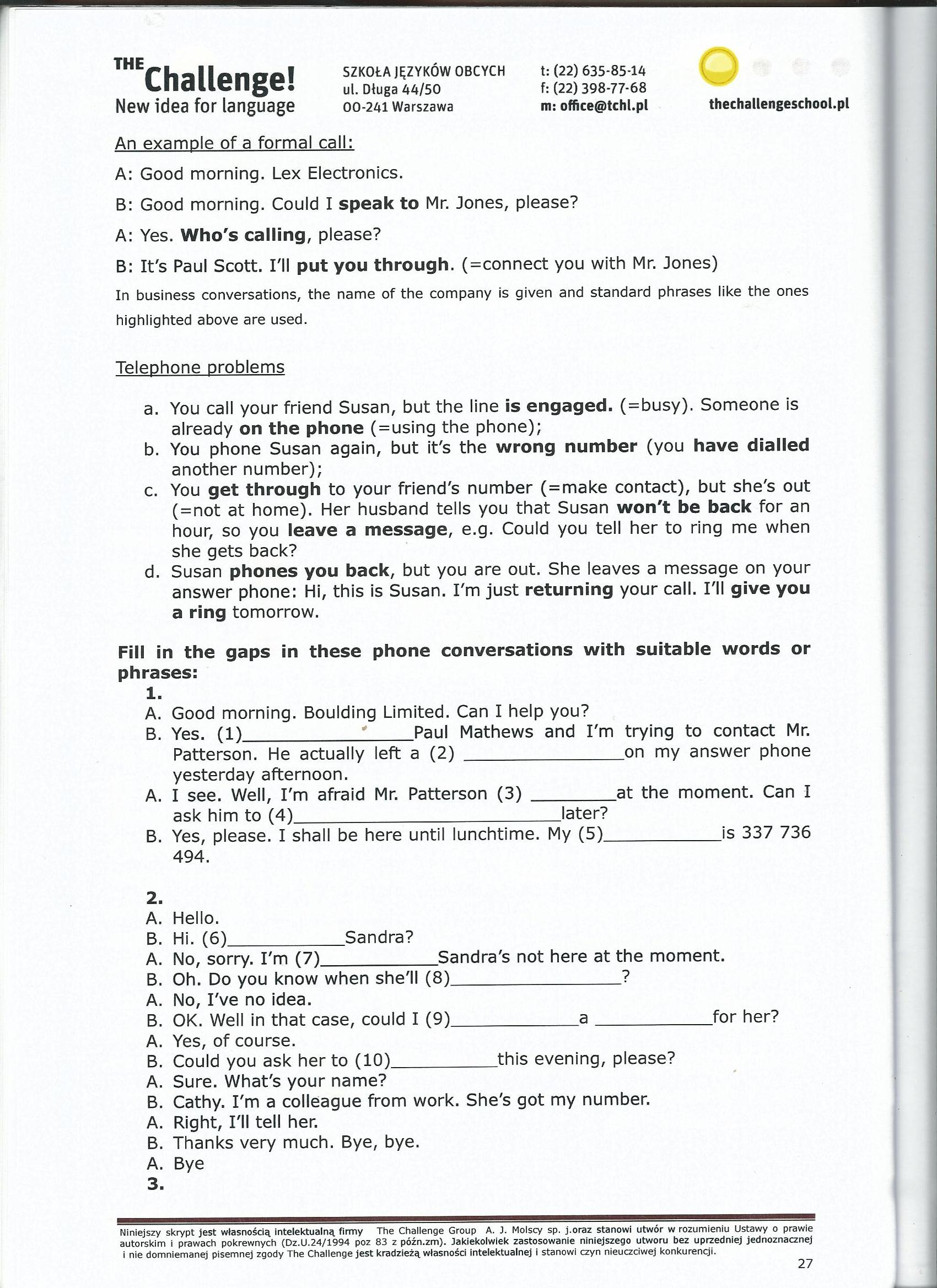Scan0027

t: (22) 635-85-14 f: (22) 398-77-68
m: office@tchl.pl thechallengeschool.pl
THF
r h a 11 o n oo I SZK0ŁA ^ZYK0W 0BCYCH
tlldllClIgC. ul. Długa 44/50
New idea for language 00-241 warszawa
An example of a formal cali:
A: Good morning. Lex Electronics.
B: Good morning. Could I speak to Mr. Jones, please?
A: Yes. Who's calling, please?
B: It's Paul Scott. Tli put you through. (=connect you with Mr. Jones)
In business conversations, the name of the company is given and standard phrases like the ones highlighted above are used.
Telephone problems
a. You cali your friend Susan, but the linę is engaged. ( = busy). Someone is already on the phone ( = using the phone);
b. You phone Susan again, but it's the wrong number (you have dialled another number);
c. You get through to your friend's number ( = make contact), but she's out ( = not at home). Her husband tells you that Susan won't be back for an hour, so you leave a message, e.g. Could you tell her to ring me when she gets back?
d. Susan phones you back, but you are out. She leaves a message on your answer phone: Hi, this is Susan. Tm just returning your cali. I'll give you a ring tomorrow.
Fili in the gaps in these phone conversations with suitable words or phrases:
1.
A. Good morning. Boulding Limited. Can I help you?
B. Yes. (1)_Paul Mathews and Tm trying to contact Mr.
Patterson. He actually left a (2) _on my answer phone
yesterday afternoon.
A. I see. Weil, I'nn afraid Mr. Patterson (3) _at the moment. Can I
ask him to (4)_later?
B. Yes, please. I shall be here until lunchtime. My (5)_is 337 736
494.
2.
A. Hello.
B. Hi. (6)_Sandra?
A. No, sorry. Tm (7)_Sandra's not here at the moment.
B. Oh. Do you know when she'11 (8)_?
A. No, I've no idea.
B. OK. Weil in that case, could I (9)_a_for her?
A. Yes, of course.
B. Could you ask her to (10)_this evening, please?
A. Surę. What's your name?
B. Cathy. Tm a colleague from work. She's got my number.
A. Right, Tli tell her.
B. Thanks very much. Bye, bye.
A. Bye
3.
Niniejszy skrypt jest własnością intelektualną firmy The Challenge Group A. J. Molscy sp. j.oraz stanowi utwór w rozumieniu Ustawy o prawie autorskim i prawach pokrewnych (Dz.U.24/1994 poz 83 z późn.zm). Jakiekolwiek zastosowanie niniejszego utworu bez uprzedniej jednoznacznej i nie domniemanej pisemnej zgody The Challenge jest kradzieżą własności intelektualnej i stanowi czyn nieuczciwej konkurencji.
27
Wyszukiwarka
Podobne podstrony:
Scan0012 t: (22) 635-85-14 f: (22) 398-77-68 m: office@tchl.pl thechaUengeschool.p
Scan0013 t: (22) 635-85-14 f: (22) 398-77-68 m: office@tchl.pl
Scan0014 2 t: (22) 635-85-14 f: (22) 398-77-68 m: office@tchl.pl
Scan0031 t: (22) 635-85-14 f: (22) 398-77-68 m: office@tchl.pl thechallengeschool.
Scan0034 t: (22) 635-85-14 f: (22) 398-77-68 m: office@tchl.pl
Scan0039 t: (22) 635-85-14 f: (22) 398-77-68 m; office@tchl.pl thechallengeschool.
Scan0047 t: (22) 635-85-14 f: (22) 398-77-68 m: office@tchl.pl thechallengeschool.
Scan0049 t: (22) 635-85-14 f: (22) 398-77-68 m: office@tchl.pl thechallengeschool.
Scan0050 t: (22) 635-85-14 f: (22) 398-77-68 m: office@tchl.pl
Scan0066 t: (22) 635-85-14 f: (22) 398-77-68 m: office@tchl.pl
Scan0005 3 THEChallenge!New idea for language SZKOŁA JĘZYKÓW OBCYCH t: (22) 635-85
Scan0008 2 I Challenge! fce* idea for language SZKOŁA JĘZYKÓW OBCYCH t: (22) 635-8
Scan0023 THEChallenge!New idea for language SZKOŁA JĘZYKÓW OBCYCH t: (22) 635-85-1
Scan0029 ™EChallenge!New idea for language SZKOŁA JĘZYKÓW OBCYCH t: (22) 635-85-14
Scan0030 THEChallenge!New idea for language SZKOŁA JĘZYKÓW OBCYCH t: (22) 635-85-1
Scan0037 ™EChallenge! New idea for language SZKOŁA JĘZYKÓW OBCYCH t: (22) 635-85-1
Scan0038 THEChallenge! New idea for language SZKOŁA JĘZYKÓW OBCYCH t: (22) 635-85-
Scan0040 2 THEChallenge! New idea for language SZKOŁA JĘZYKÓW OBCYCH t: (22) 635-8
Scan0060 THEChallenge! New idea for language SZKOŁA JĘZYKÓW OBCYCH t: (22) 635-85-
więcej podobnych podstron